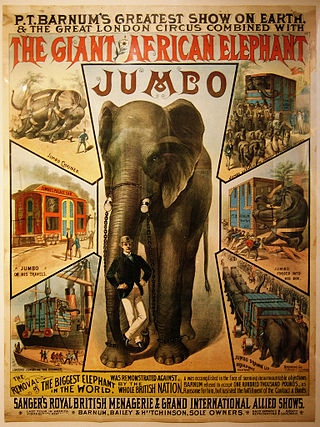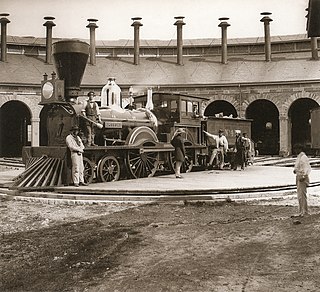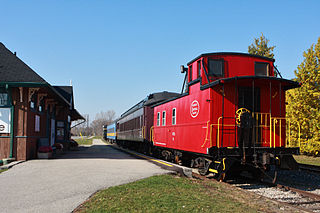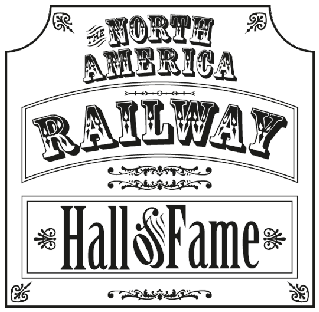
The Canadian Pacific Railway, also known simply as CPR or Canadian Pacific and formerly as CP Rail (1968–1996), is a Canadian Class I railway incorporated in 1881. The railway is owned by Canadian Pacific Railway Limited, which began operations as legal owner in a corporate restructuring in 2001.

Jumbo, also known as Jumbo the Elephant and Jumbo the Circus Elephant, was a 19th-century male African bush elephant born in Sudan. Jumbo was exported to Jardin des Plantes, a zoo in Paris, and then transferred in 1865 to London Zoo in England. Despite public protest, Jumbo was sold to P. T. Barnum, who took him to the United States for exhibition in March 1882.

The St. Lawrence and Atlantic Railroad, known as St-Laurent et Atlantique Quebec in Canada, is a short-line railway operating between Portland, Maine, on the Atlantic Ocean, and Montreal, Quebec, on the St. Lawrence River. It crosses the Canada–US border at Norton, Vermont, and Stanhope, Quebec, and is owned by short-line operator Genesee & Wyoming.
The Champlain and St. Lawrence Railroad (C&SL) was a historic railway in Lower Canada, the first Canadian public railway and one of the first railways built in British North America.

The St. Clair Tunnel is the name for two separate rail tunnels which were built under the St. Clair River between Sarnia, Ontario and Port Huron, Michigan. The original, opened in 1891 and used until it was replaced by a new larger tunnel in 1995, was the first full-size subaqueous tunnel built in North America. It is a National Historic Landmark of the United States, and has been designated a civil engineering landmark by both US and Canadian engineering bodies.

The Toronto, Hamilton and Buffalo Railway was a railway based in Hamilton that ran in Southern Ontario from 1892 to 1987. It never reached the other two cities in its name, although it did have branch lines extending to Dunnville and Port Maitland.

The Great Western Railway was a railway that operated in Canada West, today's province of Ontario, Canada. It was the first railway chartered in the province, receiving its original charter as the London and Gore Railroad on March 6, 1834, before receiving its final name when it was rechartered in 1845.

The Michigan Central Railroad was originally incorporated in 1846 to establish rail service between Detroit, Michigan, and St. Joseph, Michigan. The railroad later operated in the states of Michigan, Indiana, and Illinois in the United States and the province of Ontario in Canada. After about 1867 the railroad was controlled by the New York Central Railroad, which later became part of Penn Central and then Conrail. After the 1998 Conrail breakup, Norfolk Southern Railway now owns much of the former Michigan Central trackage.

The Northern Railway of Canada was a railway in the province of Ontario, Canada. It was the first steam railway to enter service in what was then known as Upper Canada. It was eventually acquired by the Grand Trunk Railway, and is therefore a predecessor to the modern Canadian National Railway (CNR). Several sections of the line are still used by CNR and GO Transit.

The Port Stanley Terminal Rail(PSTR) is a heritage railway that passes over the historic tracks of The London and Port Stanley Railway (L&PS) between Port Stanley and St. Thomas, Ontario. The tourist trains began operating in 1983, after volunteers started maintaining the abandoned L&PS train corridor.

The Canada Southern Railway, also known as CSR, was a railway in southwestern Ontario, Canada, founded on February 28, 1868 as the Erie and Niagara Extension Railway. Its name was changed to Canada Southern Railway on December 24, 1869. The 1868 Act specified that it was to be constructed at a broad gauge of 5 ft 6 in, but that requirement was repealed in the 1869 Act, thus allowing construction at the standard gauge of 4 ft 8+1⁄2 in.

The London and Port Stanley Railway was a Canadian railway located in southwestern Ontario. It linked the city of London with Port Stanley on the northern shore of Lake Erie, a distance of approximately 25 miles (40 km).

A spreader is a type of maintenance equipment designed to spread or shape ballast profiles. The spreader spreads gravel along the railroad ties. The various ploughs, wings and blades of specific spreaders allow them to remove snow, build banks, clean and dig ditches, evenly distribute gravel, as well as trim embankments of brush along the side of the track. Spreaders quickly proved themselves as an extremely economical tool for maintaining trackside drainage ditches and spreading fill dumped beside the track.

The Waterloo Central Railway (WCR) is a non-profit heritage railway owned and operated by the Southern Ontario Locomotive Restoration Society (SOLRS). In May 2007, SOLRS received joint approval from the Region of Waterloo and the City of Waterloo to run trains from Waterloo to St Jacobs and potentially as far north as Elmira. On a typical operating day, the train runs three times a day on Tuesdays, Thursdays and Saturday. In 2015, the railway lost regular running rights south of Northfield Drive to make way for the Ion light rail project. All Market Train service now runs between St. Jacobs Farmers' Market, the Village of St. Jacobs, and Elmira, Ontario.
The London and Lake Erie Railway and Transportation Company is a defunct Interurban railway that operated in Ontario, Canada from 1902 to 1918. Originally chartered as the South Western Traction Company, the line was renamed the London and Lake Erie Railway in 1909. Throughout its short life, the line was always referred to locally as "The Traction Line".
The New York Central Railroad's 1290 and 1291 were a pair of Canadian F-82 4-6-0 "Ten-Wheelers". They were built in July and November 1900 by the Canada Southern Railway in the company's St. Thomas, Ontario, shops. Costing $18,537.82 each, they originally received the numbers 449 and 454. Four years later, the railroad was leased to the Michigan Central Railroad for 99 years, and the two locomotives were renumbered to 8152 and 8153 in 1905. In 1929, the railroad was subleased to the New York Central, where it became its St. Clair Subdivision. During this time, the two steam engines were principally used on the St. Clair Subdivision, along with the Fort Erie and Niagara Falls branch lines. The locomotives were renumbered again in 1936, to 880 and 881. This lasted 12 years before they were renumbered a final time, to 1290 and 1291.

North America Railway Hall of Fame (NARHF) is a not-for-profit organization housed in the recently restored Canada Southern Railway Station in St. Thomas, Ontario, Canada. It was founded to maintain, preserve and honor railway history with the induction into the Hall of Fame of people, events, structures, railway art forms, rolling stock, technical innovations, railway workers and trains, and inventions in the railway history. Incorporated in 1996 its goal is to educate the public about the impact of railway transportation in the categories of "North America," as well as "National", specific to Canada and "Local"

The Canada Southern Railway Station (CASO) is a former railway station in St. Thomas, Ontario, Canada. The station was built by the Canada Southern Railway (CSR) in 1873 as both a railway station and its corporate headquarters. It was one of the busiest stations in Canada during the 1920s. Train traffic ceased in the 1980s.

ETR No. 9 is an operational 0-6-0 steam locomotive built by the Montreal Locomotive Works in 1923. Originally purchased by the Essex Terminal Railway, the locomotive was in active service until 1960. It is currently owned by the Southern Ontario Locomotive Restoration Society, and is operated as a tourist attraction as part of the Waterloo Central Railway, in St. Jacobs, Ontario.
















